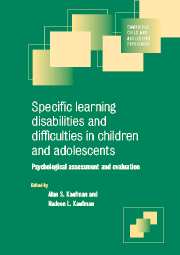 Specific Learning Disabilities and Difficulties in Children and Adolescents
Specific Learning Disabilities and Difficulties in Children and Adolescents Book contents
- Frontmatter
- Contents
- List of contributors
- Preface
- Part I History and Tradition
- Part II Alternative Cognitive Approaches to Learning Disabilities Assessment and Remediation
- 3 Application of the Woodcock—Johnson Tests of Cognitive Ability—Revised to the diagnosis of learning disabilities
- 4 The Kaufman tests — K-ABC and KAIT
- 5 Using the Cognitive Assessment System (CAS) with learning-disabled children
- 6 Application of the Differential Ability Scales (DAS) and British Ability Scales, Second Edition (BAS II), for the assessment of learning disabilities
- 7 Is dynamic assessment compatible with the psychometric model?
- 8 Multi-perspective, clinical—educational assessments of language disorders
- Part III Neuropsychological Approaches to Learning Disabilities Assessment and Remediation
- Part IV Integration and Summation
- Index
5 - Using the Cognitive Assessment System (CAS) with learning-disabled children
from Part II - Alternative Cognitive Approaches to Learning Disabilities Assessment and Remediation
Published online by Cambridge University Press: 06 January 2010
- Frontmatter
- Contents
- List of contributors
- Preface
- Part I History and Tradition
- Part II Alternative Cognitive Approaches to Learning Disabilities Assessment and Remediation
- 3 Application of the Woodcock—Johnson Tests of Cognitive Ability—Revised to the diagnosis of learning disabilities
- 4 The Kaufman tests — K-ABC and KAIT
- 5 Using the Cognitive Assessment System (CAS) with learning-disabled children
- 6 Application of the Differential Ability Scales (DAS) and British Ability Scales, Second Edition (BAS II), for the assessment of learning disabilities
- 7 Is dynamic assessment compatible with the psychometric model?
- 8 Multi-perspective, clinical—educational assessments of language disorders
- Part III Neuropsychological Approaches to Learning Disabilities Assessment and Remediation
- Part IV Integration and Summation
- Index
Summary
Introduction
The Wechsler scales have dominated the field of intelligence testing for some time and the test continues to be the most widely used measure (Wilson & Reschly, 1996). It is important to consider, however, that the Wechsler approach to measuring intelligence represents a tradition in psychological assessment that began with the publication of the Wechsler—Bellevue Scales in 1939. Wechsler developed the Wechsler—Bellevue Scales largely on the basis of the methods described in the book Army Mental Testing (Yoakum & Yerkes, 1920), which were used by the US military in the early part of the twentieth century. Wechsler borrowed many of the tests and converted them from group administration to the individually administered format used today. The technology has withstood the test of time, but recent research has suggested that this general intelligence approach has considerable limitations when exceptional children are evaluated, especially those with learning disabilities (Naglieri, 2000). The utility of the Wechsler scales for the evaluation of those specific intellectual problems associated with learning-disabled children's academic failure has led some to consider alternative perspectives (Kaufman & Kaufman, 1983; Sternberg, 1988; Das, Naglieri, & Kirby, 1994). There have been advances in psychology (especially cognitive and neuropsychology), which occurred after the development of the Wechsler scales, that have relevance to the evaluation of children with learning problems.
- Type
- Chapter
- Information
- Specific Learning Disabilities and Difficulties in Children and AdolescentsPsychological Assessment and Evaluation, pp. 141 - 177Publisher: Cambridge University PressPrint publication year: 2001
- 9
- Cited by
